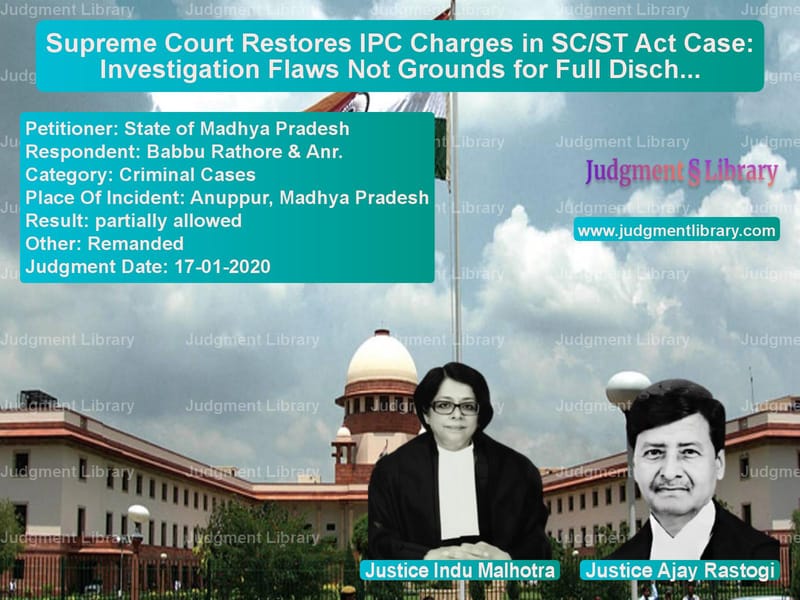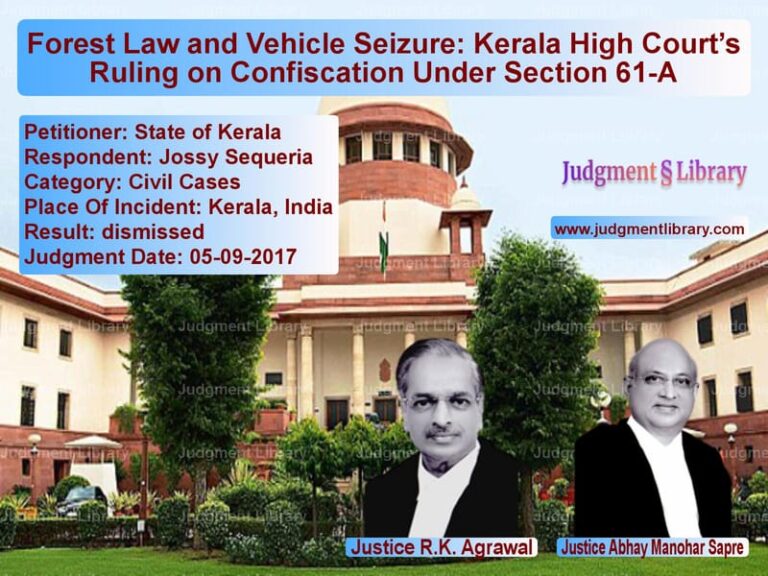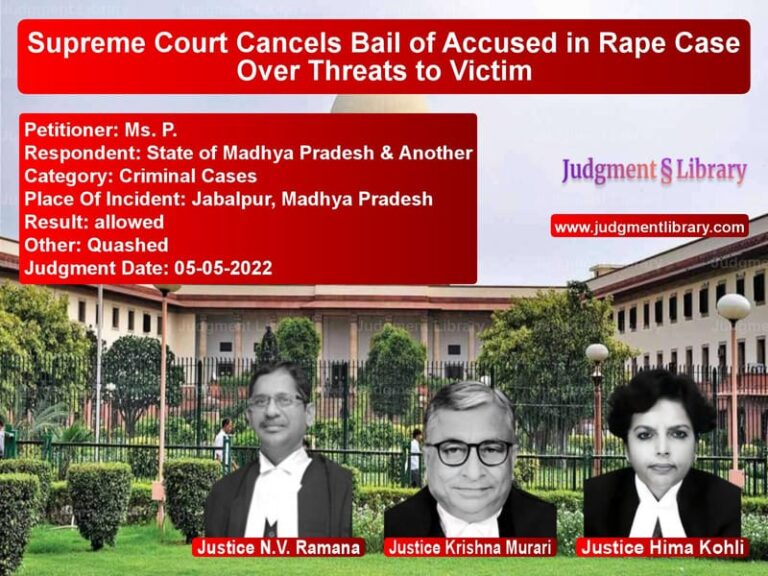Supreme Court Restores IPC Charges in SC/ST Act Case: Investigation Flaws Not Grounds for Full Discharge
The case of State of Madhya Pradesh vs. Babbu Rathore & Anr. revolves around the murder of Baisakhu, whose body was found in Anuppur, Madhya Pradesh. The Supreme Court was tasked with determining whether flaws in the investigation under the Scheduled Castes and Scheduled Tribes (Prevention of Atrocities) Act, 1989 (SC/ST Act) could justify discharging the accused from all charges, including those under the Indian Penal Code (IPC).
Background of the Case
The case began on July 14, 2011, when the dead body of Baisakhu was recovered. The prosecution alleged that the accused, Babbu Rathore and his associate, were the last persons seen with the deceased.
Key developments in the case:
- The deceased was last seen drinking with Babbu Rathore.
- Witnesses, including Kamla Prajapati, testified that the deceased was in an inebriated state when he left with the accused.
- The autopsy confirmed that Baisakhu’s death was caused by strangulation.
- Charges were framed under Sections 302/34 (murder with common intent) and 404/34 IPC (criminal misappropriation of property), as well as Section 3(2)(v) of the SC/ST Act.
During the trial, the accused argued that the investigation under the SC/ST Act was conducted by an officer below the rank of Deputy Superintendent of Police (DSP), violating Rule 7 of the Scheduled Castes and Scheduled Tribes (Prevention of Atrocities) Rules, 1995.
Trial Court’s Ruling
The trial court accepted the accused’s argument and ruled that:
- The investigation under the SC/ST Act was conducted by an officer below the rank of DSP, making it unlawful.
- Since the investigation was invalid, all charges—including those under the IPC—should be quashed.
- The accused were discharged from all charges on July 24, 2015.
High Court’s Decision
The State of Madhya Pradesh challenged the trial court’s decision in the High Court. However, on May 9, 2019, the High Court upheld the trial court’s ruling, confirming the discharge of the accused from all charges.
Arguments by the Appellant (State of Madhya Pradesh)
The State of Madhya Pradesh contended:
- The accused were charged with serious offenses under IPC in addition to the SC/ST Act.
- The investigation defect only affected the SC/ST Act charges and should not have resulted in the discharge of IPC charges.
- Witnesses had already testified, and the trial was at an advanced stage, making full discharge legally unjustified.
Arguments by the Respondents (Accused)
The accused, Babbu Rathore and his associate, defended the discharge, arguing:
- The entire investigation was flawed due to non-compliance with Rule 7 of the SC/ST Act Rules, 1995.
- If the investigation itself was unlawful, the charges framed based on that investigation should be set aside.
- The prosecution could not selectively validate charges under IPC while admitting flaws in the SC/ST Act charges.
Supreme Court’s Observations
1. Validity of IPC Charges Despite Investigation Flaws
The Supreme Court noted that:
“While an investigation under the SC/ST Act must be conducted by a DSP-level officer, this procedural lapse does not automatically invalidate charges under the IPC.”
The Court clarified that only the SC/ST Act charges were affected by the flawed investigation, while the IPC charges could proceed independently.
2. Importance of Independent IPC Prosecution
The Supreme Court cited State of M.P. vs. Chunnilal (2009), which held that:
“If an offense is committed under both IPC and SC/ST Act, a flawed SC/ST Act investigation does not invalidate a competent IPC investigation.”
3. Reinstatement of IPC Charges
The Court ruled that the accused were wrongly discharged from IPC offenses:
“The trial court and High Court committed an error by quashing IPC charges when the investigation for IPC offenses was conducted by a competent officer.”
Final Judgment
The Supreme Court ruled:
- The accused were discharged from SC/ST Act charges due to improper investigation.
- The IPC charges under Sections 302/34 and 404/34 were reinstated.
- The case was remanded to the Special Court in Anuppur, Madhya Pradesh, for trial on IPC charges.
Implications of the Judgment
This ruling clarifies:
- Investigation flaws in SC/ST Act cases do not automatically invalidate IPC charges.
- The SC/ST Act’s procedural requirements must be followed to ensure valid prosecution.
- Courts must differentiate between technical investigation flaws and substantive evidence.
Conclusion
The Supreme Court’s ruling ensures that serious criminal charges are not dismissed due to technical errors. By reinstating the IPC charges, the Court has reinforced that procedural flaws should not override substantive justice.
Petitioner Name: State of Madhya Pradesh.Respondent Name: Babbu Rathore & Anr..Judgment By: Justice Indu Malhotra, Justice Ajay Rastogi.Place Of Incident: Anuppur, Madhya Pradesh.Judgment Date: 17-01-2020.
Don’t miss out on the full details! Download the complete judgment in PDF format below and gain valuable insights instantly!
Download Judgment: State of Madhya Prad vs Babbu Rathore & Anr. Supreme Court of India Judgment Dated 17-01-2020.pdf
Direct Downlaod Judgment: Direct downlaod this Judgment
See all petitions in Murder Cases
See all petitions in SC/ST Act Case
See all petitions in Judgment by Indu Malhotra
See all petitions in Judgment by Ajay Rastogi
See all petitions in partially allowed
See all petitions in Remanded
See all petitions in supreme court of India judgments January 2020
See all petitions in 2020 judgments
See all posts in Criminal Cases Category
See all allowed petitions in Criminal Cases Category
See all Dismissed petitions in Criminal Cases Category
See all partially allowed petitions in Criminal Cases Category







